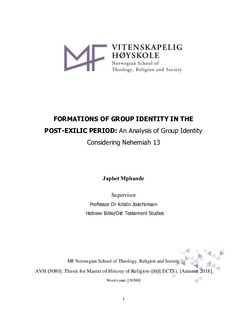Formations of Group Identity in the Post-Exilic Period : an Analysis of Group Identity Considering Nehemiah 13
Master thesis
Permanent lenke
http://hdl.handle.net/11250/2586061Utgivelsesdato
2018Metadata
Vis full innførselSamlinger
Sammendrag
Reading Nehemiah 13 closes reveals intriguing aspects of social life in Judea, a province that had changed hands from Babylon to Persia at that time. It was time when Judah regained her freedom. Those who had been exiled are believed to have continued the worship of Yahweh in Babylon despite obvious opposition to that. As they returned exiles, they continued worshipping Yahweh. These returned Judeans took upon themselves the title as the legitimate Israel. To smoothly facilitate that, records of people belonging to this group were tabulated, that was a clear mark that this was another “Israel” besides the “Israel” that did not go into exile. This study explores the formation of group identity in the post-exilic era with regards to details of Nehemiah 13. In order to maintain the group, exclusivism was fundamental, the members appreciated ancestry linage, marrying from the out-group was totally banned though not everyone kept the oath, and hence, mixed marriages crept in. Monotheism was heavily emphasised. During the time of Nehemiah the law was upheld and many members of the in-group got themselves entangled into the law from the Book of Moses. Despite external influence, the group successfully maintained its borders and its group identity was recognised.
